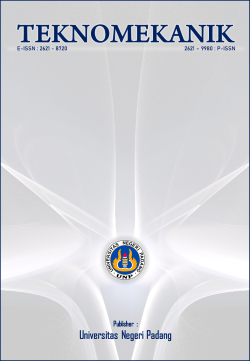Need analysis for the development of Kolb and 4C integration learning model-basel lesson plan in Pedagogy Course
DOI:
https://doi.org/10.24036/jptk.v3i1.3523Keywords:
Need Analysis, Planning Development, Pedagogy, Kolb learning, 4C SkillsAbstract
This study aims to: 1) Analyze the learning process to obtain information on the needs of lecturers and students as well as expectations in learning pedagogy, 2) analyze the learning styles of students by knowing each learning style of each student, 3) Analysis the learning models such as what was developed that can teach students according to the learning styles of each student. The research method used was a survey method. The data were collected by using questionnaires, interviews and observations. The results of this research obtained the level of mastery of the current pedagogical competence of students and the type of learning style of each student that illustrated the characteristics of their learning style. Then, the model used in the development of learning planning was the learning model of learning that can learn students according to the learning style of students so as creating the activeness of students in learning, critical thinking, creative, communicative and collaborative.
Downloads
References
Eishani Khalil Allah. et, al, The Relationship Between Learning Styles And Creativity. Journal of Social and Behavioral Sciences, 114 pp 52-55. 2014.
Kolb, David A. Experiential Learning. New Jersey: Prentice Hall, Inc. Englewood Cliffs. 1984.
Sugianto, Pengaruh Gaya Belajar experiential Learning dalam peningkatan Prestasi akademik Dan Penerapannya Dalam pembelajaran. paradigma Vol VIII No 15, pp 42-64. 2013.
Silberman, Mel. Handbook Experiential Learning. Bandung : Nusa Media. 2016.
Sudria, Ida Bagus Nyoman, dkk, Effect Of Kolb's Learning Styles Under Inductive Guided-Inquiry Learning On Learning Outcomes”. International Journal of Instruction, Vol 11 No 1, pp 89-102. 2018.
Sholihah, Mar’tus, dkk, Pengaruh Experiential Learning Model Kolb Learning Terhadap Kemampuan Berpikir Siswa. Jurnal Pendidikan Teori, Penelitian dan Pengembangan, Vol 1 No. 11, pp 2096-2100. 2016.
Barida, Muda, Model Experiential Learning dalam Pembelajaran untuk Meningkatkan Keaktifan Bertanya Mahasiswa. Jurnal Fokus Konseling, Vol 4 No.2, pp 153-161. 2018.
Kolb, A David and Alice Y. Kolb. The Kolb Learning Style Inventori 4.0: Guide to Theory, Psychometrics Research & Applications, Experience Based Learning Systems, Inc. 2016.
Lang, Hellmut R & David N. Evans. Models, Strategi, and Method. For Effective Teaching. USA. Pearson Education, Inc. 2006.
Destiani, Bosnita dan Pipit Utami, Urgensi Kompetensi Pedagogik Guru Vokasional Pada Pembelajaran Abad 21. Journal Electronics, Informatics, and Vocational Education, Vol 2 No 2, pp 211-222. 2017.
Supiyanto, Yudi dan Dumiyati, Pengembangan Model Pembelajaran Microteaching Berbasis Experiential Learning Untuk Meningkatkan Keterampilan Mengajar”. Jurnal Pengembangan Luaran Penelitian dan Pengabdian kepada Masyarakat Menuju Hak Kekayaan Intelektual (HKI) untuk Peningkatan Daya Saing Mendukung Kemandirian Bangsa, Vol 2, pp 13-20. 2017.
Azrai, Eka Putri, dkk, The Influence of David Kolb’s Learning Style (Diverger, Assimilator, Converger,Accommodator) to Students Learning Outcomes in Environmental Pollution, journal pendidikan biologi (BIOSFERJPB), Vol 10 No 1, pp 9-16. 2017.
Downloads
Published
Issue
Section
License
Copyright (c) 2020 Isnawati Isnawati, Nizwardi Jalinus

This work is licensed under a Creative Commons Attribution 4.0 International License.





